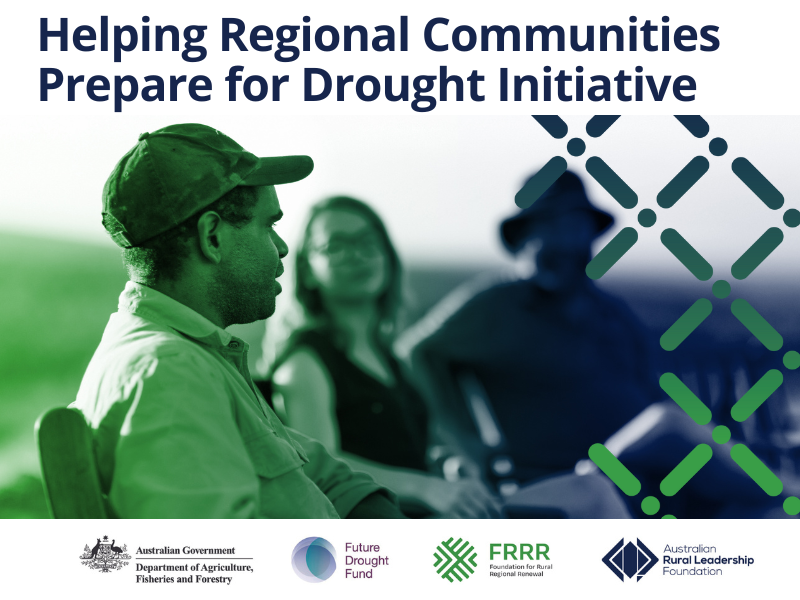Foundation for Rural & Regional Renewal (FRRR)
Local not-for-profits (NFPs) across the Central West NSW and WA Great Southern region are being encouraged to submit an Expression of Interest (EOI) to partner with the Foundation for Rural & Regional Renewal (FRRR) and the Australian Rural Leadership Foundation (ARLF) to lead the Future Drought Fund’s Helping Regional Communities Prepare for Drought Initiative’s Community Impact Program in their region.

The Initiative seeks to help agriculture-dependent communities in regions across remote, rural, and regional Australia that are vulnerable to the impacts of drought become more prepared for and resilient to these impacts.
It is part of the Australian Government’s $29.6 million investment in drought resilience initiatives over three years and builds on the Future Drought Fund’s previous Networks to Build Drought Resilience program (led by FRRR) and the Drought Resilience Leaders program (led by ARLF).
There are two main components to the program:
- Community Impact Grants: Grants between $200,000 and $500,000 for projects that strengthen community networks, capabilities and facilities that support drought preparedness; and
- Community Leadership Activities: AARLF will offer a range of funded leadership development activities to support community members to develop their leadership skills and equip them with the networks to respond to drought preparedness in their community.
Nina O’Brien, FRRR’s Disaster Resilience and Climate Solutions Portfolio Lead, said that this a great opportunity for community groups in Central West NSW and the Great Southern region of WA to proactively strengthen drought resilience across their regions.
“Rural communities are better able to withstand the impacts of events like drought when they are strong and well connected. The overall aim of this program is to ensure communities are better prepared for future.
“But we know that looks different in each community, which is why we are looking for a local lead partner. They can then work with other community members and organisations to identify what local action will be most appropriate. FRRR staff will be there to support the process and we’ll also fund a facilitator to work with the community to get the best outcome possible.
“The grants can fund projects, events, initiatives, training, capability building and small-scale community infrastructure projects and we’re really keen to make sure that First Nations communities and younger people are also engaged in drought resilience planning and action.
“We have already funded some impressive projects in other ag-dependent communities, including training and awareness-building activities to develop skills and knowledge to face the unique challenges caused by drought, preparedness upskilling and capacity building for local NFPs, and youth-focused activities such as field training and skills development programs,” Ms O’Brien explained.
As part of the program, ARLF will offer several complementary Leadership Development Activities at no cost to the successful applicants. These are designed to strengthen the leadership capabilities of communities to build individual and community drought resilience.
ARLF’s Chief Executive Officer Matt Linnegar said that because every lead organisation and region will be at a different point in their resilience journey, ARLF has a number of options that communities can tap into.
“We have five leadership development activities, ranging from intensive residential leadership programs to a series of deep-dives into particular leadership topics to group coaching. Each is underpinned by the concepts of adaptive leadership, resilience and network leadership.
“Applicants will need to include their preference for leadership development activities when they lodge their express of interest for the Community Impact Program, and we will work closely with applicants to refine their preferences as we move through the collaborative project design phase,” Mr Linnegar explained.
Expressions of Interest close 9 June, with shortlisted groups commencing co-design in their communities in August and funding confirmed in November 2023. Groups will have until June 2025 to implement the projects.
Interested groups can learn more about the program and lodge their EOI here.

